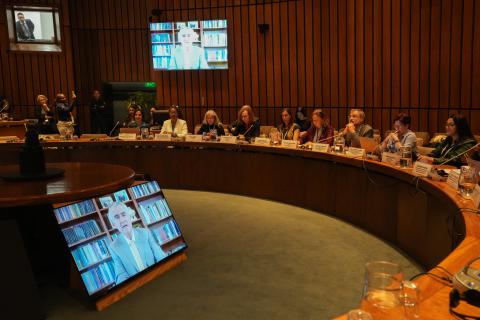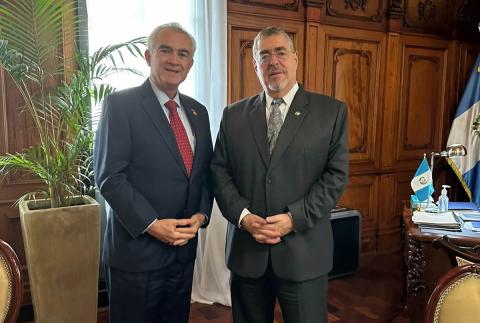News
Ministers and high-level authorities from the machineries for the advancement of women in Latin America and the Caribbean participated on February 28 in briefing on the 68th session of the Commission on the Status of Women (CSW 68), organized by the Economic Commission for Latin America and the Caribbean (ECLAC) and UN Women virtually.
CSW 68 will take place at the United Nations headquarters in New York from March 11 to 22, with the priority theme of "Accelerating the achievement of gender equality and the empowerment of all women and girls by addressing poverty and strengthening institutions and financing with a gender perspective."
The purpose of the briefing was to share progress and information from the region to support governments' participation in CSW. The Declaration of Ministers and High Authorities of the National Machineries for the Advancement of Women of Latin America and the Caribbean for CSW68 was emphasized. This declaration was approved at the 65th Meeting of the Presiding Officers of the Regional Conference on Women and will be taken as a regional contribution to global deliberations at the upcoming CSW.
The meeting was attended by ministers and representatives from twenty-five countries in the region. The meeting opened with welcoming remarks from Ana Güezmes García, Director of the Division for Gender Affairs of ECLAC, and María Florencia González, First Secretary of the Permanent Mission of Argentina to the United Nations and vice president designated by the Group of States of Latin America and the Caribbean, who shared the organization of work and the negotiation process of the Agreed Conclusions, which is the intergovernmental agreement resulting from the CSW sessions.
María Noel Vaeza, Regional Director of UN Women for the Americas and the Caribbean, highlighted that "financing policies and institutions for equality are extremely important for the region, particularly after the pandemic, as there has been an increase in poverty and inequality. We are facing the challenge of addressing the issue through the expansion of fiscal space, the creation and strengthening of comprehensive care systems, and the consolidation of gender institutional frameworks to address all challenges."
During the briefing, the joint document "The 2030 Agenda for Sustainable Development and the Regional Gender Agenda in Latin America and the Caribbean. Gender Indicators up to 2023”, prepared by ECLAC and UN Women, was presented. The purpose is to provide a reference document to drive decision-making that accelerates the achievement of equality and the full exercise of the rights of women, adolescents, and girls in their diversity.
During the presentation, Ana Güezmes pointed out that "it is a document that helps us break the statistical silence. This is a region that is advancing towards gender equality, but it needs to accelerate progress. To materialize this effort in implementation, we need better statistics and, of course, more, and better institutional frameworks and financing for gender equality. There are 118 women in poverty and 120 women in extreme poverty for every 100 men in similar situations," and added that "gender inequality and the feminization of poverty are structural problems for countries, and they require transformative responses."
Finally, Cecilia Alemany, Deputy Regional Director of UN Women for the Americas and the Caribbean, highlighted some of the figures from the joint document, warning that "gender institutional frameworks are advancing, but they have not yet been consolidated at the ministerial level throughout the region, and there are still huge gaps that require gender perspective policies and financing. In the region, among young people aged 15 to 24, almost 14% neither study nor work, and in the case of young women, this figure doubles to almost 27%, affecting their ability to have their own income now, as well as their potential job insertion throughout their lives."
The priority theme of CSW68 also serves as a framework for the commemoration of International Women's Day, which, takes place every March 8th and this year emphasizes the theme "Invest in Women, Accelerate Progress," which in Latin America and the Caribbean is focusing on "Finance Women's Rights to Accelerate Equality,". Sufficient, regular, and timely financing is vital to strengthen gender institutional frameworks, women's and civil society organizations, and for women and girls, especially those facing multiple forms of discrimination, to exercise their rights and live a life free of violence.
The Commission on the Status of Women (known by its acronym in English, CSW) is the principal intergovernmental body exclusively dedicated to the promotion of gender equality and the empowerment of women within the United Nations. Its session is held annually in New York during the second half of March, bringing together thousands of representatives from States, civil society, especially feminist and women's organizations, and United Nations entities from around the world.



